The Sovereign Reverse designs
The Sovereign dates back to the Tudor era, when Henry VII ordered the issue of a large gold coin of 20 shillings. However, the modern Sovereign didn’t come into existence until 1817. The aim was to make the new coin as distinctive as possible; as a result it featured a new reverse design by the Italian engraver Benedetto Pistrucci, showing St George and the dragon.
Experts were soon praising Pistrucci’s design and The Sovereign became one of the world’s most widely recognised coins. In the 200 years since it first appeared, the reverse of The Sovereign has only changed a handful of times.
The Sovereign has its origins in the Tudor era, when a large gold coin of 20 shillings called a Sovereign was first issued during the reign of Henry VII. However, the modern Sovereign was confirmed as currency by Royal Proclamation on 1 July 1817. It featured a new reverse design by Italian engraver and medallist, Benedetto Pistrucci, which depicted St George and the dragon and was deliberately intended to make the coin as distinctive as possible. This beautiful, classic design remains on gold Sovereigns today and is considered to be one of the world’s most widely recognised coins. In 200 years, the reverse has rarely changed, with only a handful of designs appearing on The Sovereign since 1817.
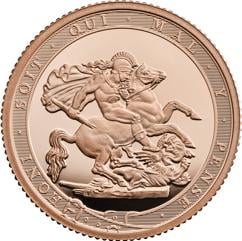
2017 Sovereign reverse
In 2017 we are celebrating the 200th anniversary of the design created by Benedetto Pistrucci with a new range of Sovereigns.
Designed by Benedetto Pistrucci
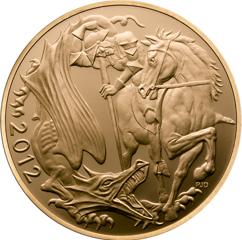
2012 Sovereign Reverse – The Diamond Jubilee Sovereign
In 2012 Her Late Majesty The Queen celebrated her Diamond Jubilee. To celebrate the occasion The Royal Mint commissioned a new St George and the dragon reverse which was designed by Paul Day.
Designed by Paul Day
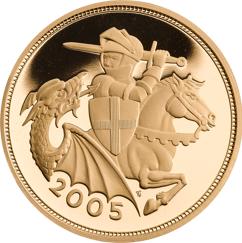
2005 Sovereign Reverse – A new St George
In 2005 The Royal Mint introduced a modern interpretation of St George and the dragon for the reverse of The Sovereign, designed by Timothy Noad.
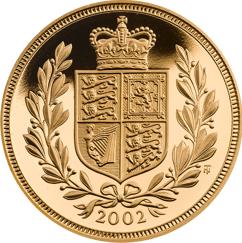
2002 Sovereign Reverse – The Golden Jubilee Sovereign
In 2002 The Queen celebrated her Golden Jubilee. To mark the event The Royal Mint unveiled a new reverse of The Sovereign, featuring the shield of the Royal Arms. Designed by Timothy Noad, the image was similar to a reverse that was struck in 1838 during Queen Victoria’s reign.
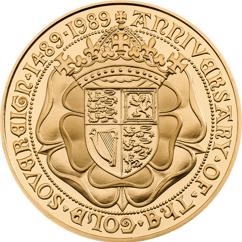
1989 Sovereign Reverse – 500th Anniversary of the Sovereign
In 1989, The Sovereign celebrated its 500th anniversary, having been commissioned on 28 October 1489 by Henry VII. The Royal Mint asked Bernard Sindall to create a unique reverse. The design showed a crowned shield of the Royal Arms on a double Tudor rose and was similar to the hammered Sovereigns created in Henry VII’s reign.
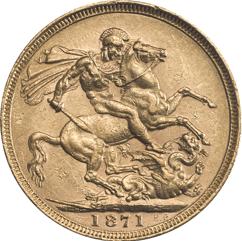
1871 Sovereign Reverse – St George returns
In 1830 an image of a shield replaced Benedetto Pistrucci’s design of St George and the dragon. During Queen Victoria’s reign, Pistrucci’s iconic image returned and appeared on Sovereigns from 1871 onwards.
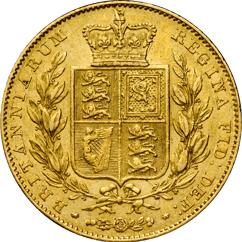
1838 Sovereign Reverse – Victoria Shield
The first Sovereigns of Queen Victoria’s reign were struck in her coronation year of 1838. During her time as queen, The Royal Mint struck Sovereigns featuring Pistrucci’s St George and the dragon and Sovereigns featuring the crowned shield of the Royal Arms, designed by Jean Baptiste Merlen.
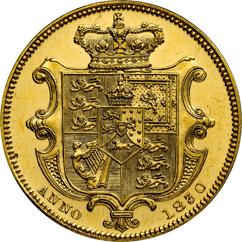
1830 Sovereign Reverse – William IV Shield
William came to the throne in 1830. He was the only monarch not to use Pistrucci’s St George and the dragon design on the reverse of The Sovereign. Instead, he used an image of the crowned shield of the Royal Arms, designed by Jean Baptiste Merlen.
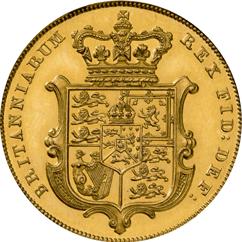
1825 Sovereign Reverse – George IV crowned shield of the Royal Arms
In 1823 George IV commissioned a completely new set of coin designs. Two years later The Royal Mint issued a new Sovereign, featuring the crowned shield of the Royal Arms designed by Jean Baptiste Merlen.
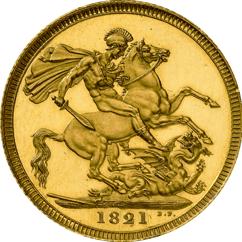
1821 Sovereign Reverse – A remodelled St George and the dragon
In 1821, The Sovereign was remodelled. The inscription ’HONI SOIT QUI MAL Y PENSE‘ was removed, which created more space for a larger, more detailed image of St George and the dragon. In Benedetto Pistrucci’s original design, the saint had been holding a broken spear but now Pistrucci portrayed him holding the mythical sword known as ‘Ascalon.’
Designed by Benedetto Pistrucci
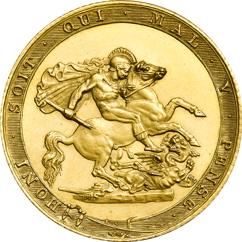
1817 Sovereign Reverse – The first appearance of St George and the dragon
Benedetto Pistrucci’s St George and the dragon design first appeared on the modern gold Sovereign in 1817. The engraver himself had suggested St George as the theme. The words ’HONI SOIT QUI MAL Y PENSE’ featured around the image, meaning “Evil unto him who thinks evil of it”. The words also featured on the Order of the Garter and the royal coat of arms.
Designed by Benedetto Pistrucci

